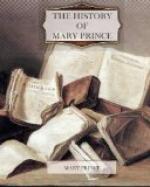To T. Pringle, Esq.
“P.S. As Mr. Wood refers to the evidence of Dr. T. Coull in opposition to Mary’s assertions, it may be proper to enable you justly to estimate the worth of that person’s evidence in cases connected with the condition and treatment of slaves. You are aware that in 1829, Mr. M’Queen of Glasgow, in noticing a Report of the “Ladies’ Society of Birmingham for the relief of British Negro Slaves,” asserted with his characteristic audacity, that the statement which it contained respecting distressed and deserted slaves in Antigua was “an abominable falsehood.” Not contented with this, and with insinuating that I, as agent of the society in the distribution of their charity in Antigua, had fraudulently duped them out of their money by a fabricated tale of distress, Mr. M’Queen proceeded to libel me in the most opprobrious terms, as “a man of the most worthless and abandoned character."[20] Now I know from good authority that it was upon Dr. Coull’s information that Mr. M’Queen founded this impudent contradiction of notorious facts, and this audacious libel of my personal character. From this single circumstance you may judge of the value of his evidence in the case of Mary Prince. I can furnish further information respecting Dr. Coull’s colonial proceedings, both private and judicial, should circumstances require it.” “J. P.”
[Footnote 20: In
elucidation of the circumstances above
referred to, I subjoin
the following extracts from the Report
of the Birmingham Ladies’
Society for 1830:—
“As a portion of the funds of this association has been appropriated to assist the benevolent efforts of a society which has for fifteen years afforded relief to distressed and deserted slaves in Antigua, it may not be uninteresting to our friends to learn the manner in which the agent of this society has been treated for simply obeying the command of our Saviour, by ministering, like the good Samaritan, to the distresses of the helpless and the desolate. The society’s proceedings being adverted to by a friend of Africa, at one of the public meetings held in this country, a West Indian planter, who was present, wrote over to his friends in Antigua, and represented the conduct of the distributors of this charity in such a light, that it was deemed worthy of the cognizance of the House of Assembly. Mr. Joseph Phillips, a resident of the island, who had most kindly and disinterestedly exerted himself in the distribution of the money from England among the poor deserted slaves, was brought before the Assembly, and most severely interrogated: on his refusing to deliver up his private correspondence with his friends in England, he was thrown into a loathsome jail, where he was kept for nearly five months; while his loss of business, and the oppressive proceedings instituted against him, were involving him in poverty and ruin. On his discharge by the House of Assembly, he was seized in their




